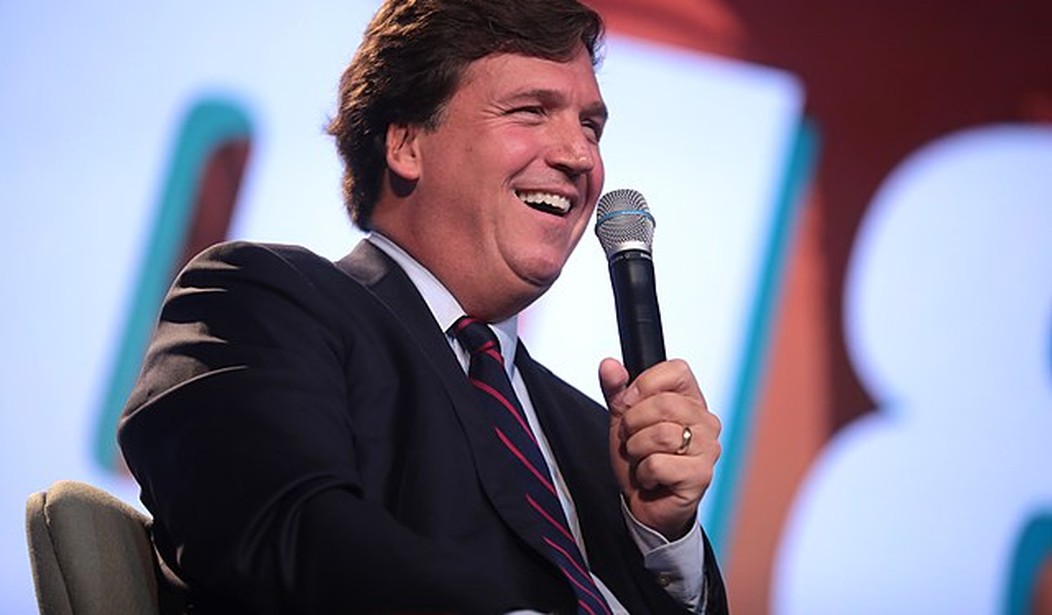Tucker Carlson went to Moscow this week and interviewed Russian dictator Vladimir Putin. Putin attacked and invaded his neighbor Ukraine and has made it clear that he's an enemy of the United States.
So naturally, many in the media and on the left want to boil Mr. Carlson in oil. Or at least, throw him in a pit of wild, hungry dogs.
"Perhaps we need a total and complete shutdown of Tucker Carlson re-entering the United States until our country's representatives can figure out what is going on," The Bulwark editor-at-large Bill Kristol said after hearing the rumor that Carlson was in Moscow.
Carlson, who at last look is a citizen of the United States and doesn't need Billy Kristol's permission to come and go, ended up getting an interview that most of the media would have committed murder to get.
Vladimir Putin probably wouldn't have sat down with a left-wing mouthpiece from NBC or CBS. But he was willing to sit down with Carlson probably because the online interview host hadn't referred to him as the devil incarnate.
Former GOP congressman Adam Kinzinger called Carlson a "traitor" for visiting Russia's capital. Carlson later confirmed the rumors that he was going there to interview Putin, setting off Kristol, Kinzinger, and half of official Washington who have suddenly discovered we shouldn't be giving the enemy free air time in the United States.
I wish that stricture was in place when Mike Wallace interviewed Iran's fanatical mass murderer Ayatollah Khomenei. Or when a dozen other journalists went to Cuba to interview another mass murderer, Fidel Castro.
Interviewing Vladimir Putin is a huge get for Tucker Carlson, which is probably the main reason so many are calling him bad names for doing it.
Vladimir Putin was the subject of an interview with Barbara Walters back in 2001. In 2015, Reuters interviewed China's President (probably for life) Xi Jinping about his intentions on the world stage. Orla Guerin of the BBC spoke with Venezuela's dictatorial Nicolás Maduro in 2019. Last October, in the wake of Hamas's bloody attack on Israel, The Economist's Zanny Minton Beddoes sat down with Moussa Abu Marzouk, a senior official with the terrorist group, to try to understand his thinking.
That interview with Marzouk may come the closest to a present-day interview with Putin because of the context of Hamas's attack and Russia's invasion of Ukraine. For most Americans, both figures are wildly unsympathetic. But it's not the job of journalists to speak only with popular figures who give their audiences warm and fuzzy feelings. They're supposed to gather news about everybody, including terrible people who are responsible for war, tyranny, and murder. And there's a real value in understanding the motives and goals of people who play an important role on the world stage.
As far as Carlson's critics are concerned, it's not Putin's politics that are at issue. It's the reporter's politics that are the problem. They would slit each other's throats for the chance to interview Putin.
And you can bet that Kristol, Kinzinger, and the rest of the crowd that thinks Carlson is a traitor for interviewing Putin wouldn't say a peep if the interviewer was Jim Acosta or some other mainstream media heavyweight.
Related: Nothing New in GOP Senate Rebellion Against McConnell
Matt Taibbi makes the point a little more eloquently.
The only reason @TuckerCarlson in Russia is controversial is because the rest of the media has bent all the way over for the censorship regime. MSNBC, CNN, they’d have gladly interviewed Putin just for the ratings once — now they’re clowns taking dictation for the security state.
— Matt Taibbi (@mtaibbi) February 6, 2024
I can’t believe the idea that @TuckerCarlson is a traitor for doing an interview with anyone is taken seriously. Are people two years old? I remember when it was destination television if U.S. anchors scored interviews with the Ayatollah or a Soviet premier. https://t.co/SDslfm4ESX
— Matt Taibbi (@mtaibbi) February 6, 2024
You might not like Tucker Carlson. We are all free to criticize him for what he writes, what he says, and even the sorts of questions he asks Putin.
But as Reason's J.D. Tucille points out, you can't bar Carlson from sharing the media stage based solely on his ideology.
But that doesn't matter. In free societies, people have the right to embrace whatever political views they like, whether in their personal lives or their professional careers. Those views are certainly fair game for criticism and, the more public the figure, the more legitimate a target they are for high-profile takedowns. But a person's ideology is neither a ticket to ride nor a bar to entry for trying to make a living as a journalist—or at least it shouldn't be if we're going to have anything resembling free media.
A "free press" needs to be challenged every once and a while on how "free" they truly are. I would say that the American media today has failed the freedom test and will continue to fail as long as they put ideology above everything else.
Including the news itself.










